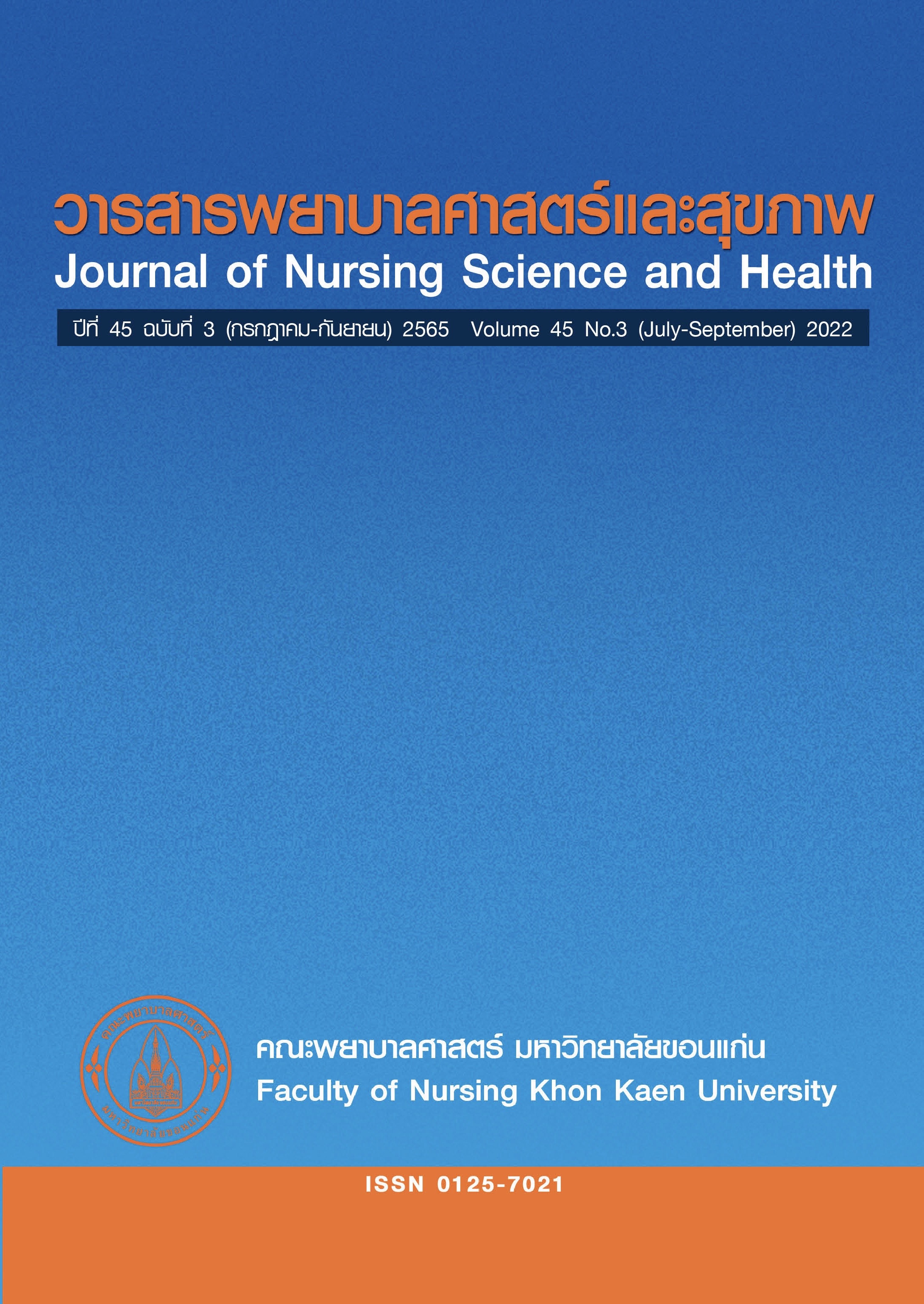ความพึงพอใจและผลลัพธ์ของการจัดการเรียนการสอนแบบออนไลน์ในรายวิชาการพยาบาลสุขภาพผู้ใหญ่ 1 ของนักศึกษาพยาบาลชั้นปีที่ 2 คณะพยาบาลศาสตร์ มหาวิทยาลัยขอนแก่น
คำสำคัญ:
ผลลัพธ์ของการจัดการเรียนรู้ , นักศึกษาพยาบาล , การเรียนแบบออนไลน์ , ความพึงพอใจบทคัดย่อ
การเปลี่ยนแปลงกระแสสังคมโลกและความก้าวหน้าทางด้านเทคโนโลยีสารสนเทศ ส่งผลต่อการใช้ชีวิตและวิธีการเรียนรู้ของผู้เรียน และจากสถานการณ์การระบาดโรคติดเชื้อไวรัส COVID-19 ทำให้มีข้อจำกัดในการจัดการเรียนรู้ในห้องเรียน ระบบการศึกษาจึงต้องปรับกระบวนทัศน์ใหม่เป็นรูปแบบออนไลน์ การศึกษานี้มีวัตถุประสงค์เพื่อศึกษาความพึงพอใจ และผลลัพธ์ของการจัดการเรียนการสอนแบบออนไลน์ในรายวิชาการพยาบาลสุขภาพผู้ใหญ่ 1 ของนักศึกษาพยาบาลชั้นปีที่ 2 รวมถึงการสะท้อนปัญหา/อุปสรรค และการให้ข้อเสนอแนะของผู้เรียน เก็บข้อมูลโดยใช้แบบสอบถามออนไลน์ ผลการศึกษาพบว่า ผู้เรียนมีความพึงพอใจต่อการจัดการเรียนการสอนโดยรวมอยู่ในระดับปานกลาง (mean 3.48, S.D. 1.41) โดยพบว่า ความพึงพอใจในด้านเนื้อหา (mean 4.05, S.D. 1.41) ผู้สอน (mean 4.02, S.D. 0.71) วิธีการจัดการเรียนการสอน (mean 3.95, S.D. 0.71) และการประเมินผล (mean 3.89, S.D. 0.00) ในระดับมาก ผู้เรียนสะท้อนว่าการจัดการเรียนการสอนแบบออนไลน์มีประโยชน์อย่างมากและเป็นรูปแบบที่เหมาะสมกับสถานการณ์ปัจจุบัน อย่างไรก็ตามผู้เรียนแต่ละคนมีปัจจัย/เงื่อนไขและข้อจำกัดต่อการแตกต่างกัน ดังนั้นการเตรียมความพร้อมของผู้เรียนทั้งด้านความพร้อมทางเทคโนโลยีและระบบสนับสนุนและด้านเนื้อหาวิชา เป็นสิ่งสำคัญในการส่งเสริมให้ผู้เรียนบรรลุตามผลลัพธ์การเรียนรู้ในรายวิชา
เอกสารอ้างอิง
Ministry of Education Thailand. Notification of the Ministry of Education on the closure of educational institutions affiliated with and under the supervision of the Ministry of Education; 2020. [cited 2019 Aug 20]. Available from: https://www.moe. go.th/. (in Thai)
Paudel P. Online education: Benefits, challenges and strategies during and after COVID-19 in Higher Education. IJonSE 2020;3(2):70–85.
Wangsrikoon A. Thai education in the 2nd century: Outcomes and development trends. Humanities and Social Sciences Journal of Graduate School Pibulsongkram Rajabhat University 2014;8(1):1-17. (in Thai)
Thangkratok P, Lhimsoonthon B, Palacheewa N, Tongtham A. Online nursing education during the coronavirus-19 pandemic: A case study of the epidemiology course. JTNMC 2021; 36(3): 31-44. (in Thai)
Dhawan S. Online learning: A panacea in the time of covid-19 Crisis. J Educ Technol 2020;49(1):5–22.
Thammametha T. E-Learning: From theory to practice. Nonthaburi: Sahamit Pringting and Company Publishing; 2014. (in Thai)
Panit V. The ways to create learnings’ student in the 21st century. Edition 1. Bangkok: Tatata Publication; 2014. (in Thai)
Songthai N, Yottavee W, Saengkhiew, P. Factors influencing the online learning behaviors of nursing students: The lower northern region. BCNUT J Nurs 2021;13(1):198-209. (in Thai)
Khuana K, Khuana T, Khieodi L. The development of an instructional model for empowering learning skills in 21st century. HuJmsu 2018;37(2):77-96. (in Thai)
Martin F, Wang C, Sadaf A. Student perception of helpfulness of facilitation strategies that enhance instructor presence, connectedness, engagement and learning in online courses. Internet High Educ 2018;37:52–65.
Draus P, Curran M. Trempus M. The influence of instructor-generated video content on student satisfaction with and engagement in asynchronous online classes. JOLT 2014;10(2):240-54.
Chopjit D, Chaisombut D, Wongsan SM. The effect of web based instruction (WBI), learning in the subject: Community health nursing II among the nursing students. JNHR 2018;11(3):95-105. (in Thai)
Thongyu R, Sanmorya S, Gidsrinopdon A. Developing of the learning and teaching with e-learning model for undergraduate nursing student in principle and techniques in nursing. JNATNO 2021;27(1):113-26. (in Thai)
Park EO, Park JH. Quasi-experimental study on the effectiveness of a flipped classroom for teaching adult health nursing. Jpn J Nurs Sci 2018;15(2):125–34.
Raes A, Detienne L, Windey I, Depaepe F. A systematic literature review on synchronous hybrid learning: Gaps identified. Learn Environ Res 2020;23(3):269–90.
ดาวน์โหลด
เผยแพร่แล้ว
รูปแบบการอ้างอิง
ฉบับ
ประเภทบทความ
สัญญาอนุญาต
ลิขสิทธิ์ (c) 2022 วารสารพยาบาลศาสตร์และสุขภาพ

อนุญาตภายใต้เงื่อนไข Creative Commons Attribution-NonCommercial-NoDerivatives 4.0 International License.
วารสารพยาบาลศาสตร์และสุขภาพเป็นเจ้าของลิขสิทธิ์ในการเผยแพร่ผลงานที่ตีพิมพ์ห้ามผู้ใดนำบทความที่ได้รับการตีพิมพ์ในวารสารพยาบาลศาสตร์และสุขภาพไปเผยแพร่ในลักษณะต่าง ๆ ดังนี้ การนำบทความไปเผยแพร่ออนไลน์ การถ่ายเอกสารบทความเพื่อกิจกรรมที่ไม่ใช่การเรียนการสอน การส่งบทความไปตีพิมพ์เผยแพร่ที่อื่น ยกเว้นเสียแต่ได้รับอนุญาตจากวารสารพยาบาลศาสตร์และสุขภาพ



